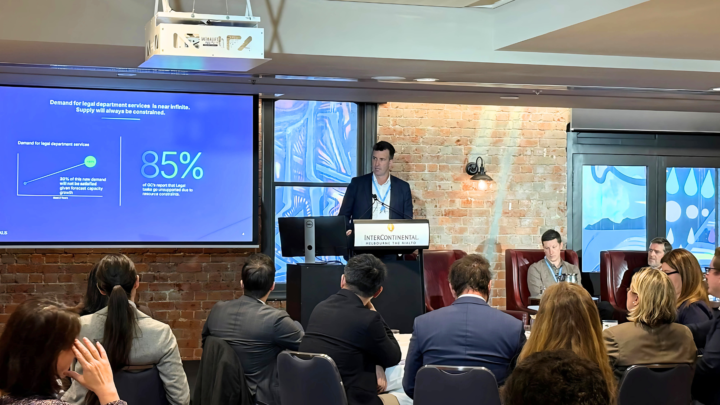ACC panel recap: How GCs are scaling compliance with AI and innovation
Five takeaways from Retail Zoo, General Motors and Plexus.

Andrew Mellett
August 07, 2025

or
.png?width=427&height=249&name=Rectangle%20202%20(2).png)
Vivamus ullamcorper nibh sed lectus
Praesent ex risus, auctor id velit vel, accumsan tincidunt tellus. Proin lacinia sagittis nisi, vel dapibus tortor molestie in. Nunc venenatis
Today I joined an executive panel at ACC’s In-House Counsel Day alongside two impressive legal executives: Ceri Clark, General Counsel of Retail Zoo, and Charlie Daalder, Regional Compliance Officer and Lead Counsel at General Motors. We unpacked the growing tension facing in-house legal: how to meet skyrocketing compliance demands without additional resources, and how to responsibly scale support using AI and automation.
Here are five insights from the conversation, relevant to any legal leader navigating the current shift.
1. AI is already part of legal work, whether legal is ready or not
AI is already being used inside businesses, often without legal’s involvement. Teams are using it to draft content, generate training modules, and answer legal questions.
People in your business are using AI on legal tasks. It’s just a question of whether or not you know about it and whether you can control it.
Legal teams are now recognising the need to engage with these tools early, not just to manage risk, but to add value. Ceri Clark explained how this is already showing up in day-to-day work. “You might not own the training module AI created, but it’s already in your system. You have to think about IP and governance from the start.” He also pointed to the longer-term risk of letting this go unchecked. “I worry less about getting AI wrong today, and more about complacency tomorrow.”
Rather than resisting this shift, legal teams are stepping in to understand where it adds value and where guardrails are needed.
2. Not all legal work needs a human lawyer
Both speakers spoke directly to a reality many in-house teams are already experiencing: large volumes of legal tasks don’t require human lawyers anymore. From reviewing HR policies to answering repetitive compliance questions, there are now clear opportunities to automate routine work without compromising quality.
“There’s legal work today that’s not done particularly well, that AI can do better,” said Ceri. “And if that frees up people to focus on the harder stuff, that’s a good thing.”
Charlie pointed to the burden of repeat queries — the same questions landing in legal inboxes day after day. “AI can’t replace lawyers,” he said, “but it can handle the repetitive questions we get 100 times a day.”
What both highlighted is that automation isn’t just a resource play, it’s a quality and impact play. When legal teams are freed from high-volume, low-complexity work, they can reallocate focus to higher-value tasks.
And critically, this shift is no longer theoretical. “I see a future where AI delivers legal guidance and we don’t flinch at that,” Ceri added.
3. Smaller legal teams face a steeper climb, but also greater impact
One of the most interesting parts of the panel was hearing Charlie Daalder speak about the realities of running a lean legal team across the APAC region. General Motors has gone through a transformation over the years moving from medium-sized legal teams to just one or two lawyers covering entire regions.
They’re often being asked to advise on jurisdictions they’ve never even visited. That level of stretch would be unsustainable without rethinking how legal support is delivered. And that’s exactly what they’ve been doing, using technology and AI to take the burden off their team.
He mentioned the flood of repetitive compliance queries they get. By automating some of those common, lower-risk tasks, they’re freeing up their lawyers to focus on the strategic work that needs their attention.
What stood out to me is that while smaller teams face greater pressure, they also tend to be more agile. Charlie was quick to point out that lean doesn’t always mean limited, not when the right technology is in place.
With reams of compliance policies, repetitive day-to-day queries, and standardised advice being delivered again and again, AI offers relief.
“We’re seeing a lot of repetitive stuff,” he noted, “and that’s what we’re trying to take off our teams.”
By automating those touch points, his legal function can focus on issues that actually require legal nuance or strategic judgment.
“Losing one person in a small legal team is losing 20 years of institutional knowledge,” Charlie warned. “AI has to help us retain that memory.”
In short, small teams feel the squeeze first but they also stand to benefit the most when they use technology not to just keep up, but to rethink how legal work gets done.
4. AI enables scale, but demands stronger governance
One of the most energising parts of the panel was hearing how far AI has already penetrated legal workflows. I shared an observation we see often at Plexus: people in the business are already using AI for legal tasks. The question is no longer if; it’s whether legal knows about it, and more importantly, whether it can control it.
As Charlie put it:
“If legal doesn’t provide a solution with guardrails, the business will find one without them.”
That’s the reality. The demand for speed and scale is pushing teams to adopt consumer-grade tools, often without understanding the legal or compliance risks. Not from negligence, but from a desire to move fast.
AI, in this context, is powerful. It can automate routine work, standardise guidance, and create structure where there was none. But without the right governance, it also creates blind spots.
As Charlie said,
“We’re not trying to create bureaucracy, but unmanaged AI is a bigger risk than policy fatigue. AI is moving faster than most governance teams can track. You need structure, review cycles, and proactive leadership.”
GCs need to stop thinking of AI as just another IT tool. This is about how legal intelligence gets distributed across the enterprise. If we want to scale that safely, governance is the foundation.
5. Legal teams still need to train people, not just tools
Ceri Clark raised a great point: as AI automates more day-to-day legal work, it’s also removing the tasks junior lawyers traditionally learned from, the kind that build instinct and sound judgment over time.
“We can’t forget that the repetitive work is where lawyers learn judgment,” he said. “That’s the challenge, figuring out how people still develop when AI takes some of that away.”
He made it clear that the goal isn’t to resist AI, but to be intentional about how teams grow alongside it. Legal roles are evolving, fast.
As Ceri put it,
“The job of legal is shifting from writing the answers to designing the platform that delivers them.”
That means training tomorrow’s legal talent can’t just be about legal accuracy it must also focus on system design, policy embedding, and strategic enablement. Without deliberate investment in capability-building, there’s a real risk of creating lawyers who never got the foundation they need to operate at a senior level.
AI can scale delivery. But it can’t develop judgment. That still takes people, and legal leaders can’t forget that.
Final thoughts
This panel didn’t promise magic fixes. But it did offer a clear-eyed view of what it actually looks like to modernise a legal function — especially in resource-constrained environments. Both GCs are in the middle of the transformation journey, not at the end of it.
The legal function is at a crossroads. GCs who lean into AI and workflow transformation will unlock scale, agility, and influence. Those who delay risk irrelevance, or worse, exposure.
The future of legal isn’t being written for us, it’s being written by us.
If you’re interested in hearing more about Plexus’ AI solutions, get in touch.


Andrew Mellett
Andrew Mellett is the Founder and CEO of Plexus, a global leader in AI-powered legal technology. Recognised by the Financial Times and Harvard Business Review for his pioneering work in legal innovation, Andrew leads Plexus’s mission to train digital lawyers, helping the world’s top companies streamline legal operations and scale expertise with artificial intelligence.
Related resources
Transforming in-house legal operations with Plexus - 2
Explore how three global organisations – Noumi, ENGIE Australia, and Caidya – overcame common legal operations challenges using Plexus.
Stay informed with legal ops insights
Monthly legal ops news, straight to your inbox.


.png)

.png)


.png)
.png)